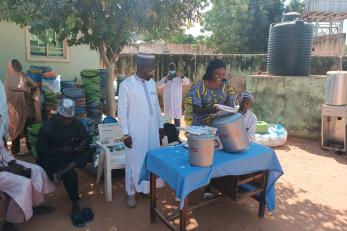Addressing hygiene issues for preventing the spread of COVID-19

Aisha Mallam Goni has lived in her neighborhood village in Gwange, Yobe state for a long time but has never heard of the COVID-19 vaccine. She said it was the same for her husband and eight children. Aisha was sensitized during one of the house-to-house sensitization campaigns held by Mercy Corps and this motivated her to get vaccinated. Aisha claimed that outside of her neighbors, she had no other means to get information.
“The government did not raise enough awareness to encourage us to visit the facility and receive the vaccine. However, after being sensitized by community volunteers working with Mercy Corps, I went ahead and got my shot. Mercy Corps did not only raise awareness about the vaccine, but also made it accessible; I see many people in my community receiving the vaccine whenever the mobile vaccination team visits the house of our village head”.
After being sensitized by community volunteers working with Mercy Corps, I went ahead and got my shot.
Aisha Malam Goni, Gwange community
House-to-house sensitization has helped to clear any form of misinformation and have increased the level of acceptance for COVID-19 vaccine within the various communities in Yobe state, of the Vaccine Access project implementation. The house-to-house sensitization is carried out by the community volunteers across all the 8 wards of the project location, where Mercy Corps is implementing in Damaturu local government area.
The main objective of the house-to-house sensitization is to reach most of the community members that may not be opportune to attend the various dialogue sessions that are held, since it will be difficult to get the whole members of the community to be present and this has helped the community members to get the firsthand information on COVID-19 from community volunteers. This has also helped to reach out to the larger group of people within the community to have a better understanding of the various vaccines available in the state.
Aisha is also a recipient of the mini hygiene kit, which includes a pack of Dettol antiseptic, soap, hand sanitizer and detergent. According to her, it will help promote good hygiene practices. “I am so grateful to Mercy Corps for giving me this soap and detergent. I can't wait to take my bath with the soap and wash my clothes with the detergent."
I can't tell you how important this bucket is to me.
Fatima Goni Bukar, Alajiri community
35years old Fatima Goni Bukar and mother of five is another beneficiary of the hygiene support. She is a native of Bindigari community, where providing safe drinking water for her family has been difficult. Fatima acknowledged that she faces difficulties in preserving clean water for her children, where they had to rely on a public pump and sometimes rain water for their needs. At the time of our interview with her, she was eight months pregnant, and unsure of how she would provide the baby with clean water once the baby is born.
To support families such as Fatima’s, the vaccine access program distributed 20-liter buckets to program participants via health facilities in their respective communities to encourage communities without basic health supplies to follow hygiene guidelines.
“I am extremely grateful for what Mercy Corps has done for my family, particularly the 20-liter bucket. I can't tell you how important this bucket is to me; after washing it, I will use it to store drinking water for myself and my family; because the one I was using was already beyond repair. Now I can practice safe drinking water hygiene, and my children can drink clean water from a new bucket,” Fatima beams with joy.
Mercy Corps has helped to maintain the hygiene levels and sense of dignity of communities and families by distributing these hygiene buckets, as well as encouraging the storage of safe drinking water at the household level. The practice of safe hygiene is one of the topics addressed at community dialogue sessions and sensitizations conducted by the COVID-19 Vaccine Access program. The dialogue sessions were held by healthcare workers, supported by Mercy Corps team members on a monthly basis. At such gathering, they would address COVID-19 vaccination concerns, myths and misconceptions, while also sharing the importance of good hygiene and sanitation.
Fatima also took the COVID-19 vaccine and when asked if the vaccine causes infertility she responded with a loud laughter, “I don't believe the vaccine causes infertility, the vaccine could have stopped me from getting pregnant. Even after I got pregnant, it would have removed the pregnancy or caused a miscarriage. My husband and I are both immunized, and we are expecting our sixth child”.
About the Vaccine Access Program
Mercy Corps Nigeria and CARE International as members of the INGO collaborative are implementing the COVID-19 Vaccine Access Program in Yobe State. The program goal is to improve COVID-19 vaccination coverage by increasing vaccine confidence, acceptance and uptake in vulnerable communities in Yobe State. It will document and share those lessons and approaches broadly for increase vaccination coverage in Nigeria.